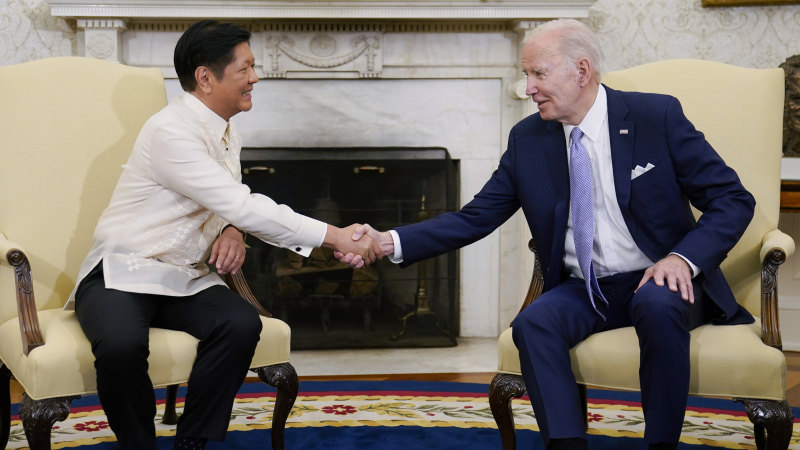When Biden met Bongbong: Allies closer amid China’s ‘provocations’
Save articles for later
Add articles to your saved list and come back to them any time.
Washington: The US has given the Philippines an ironclad commitment to defend the country as growing territorial disputes in the South China Sea highlight what the Biden administration says is a “deeply consequential period” for its Indo-Pacific allies, including Australia.
Three weeks before he arrives in Sydney for a meeting of the Quad alliance with Prime Minister Anthony Albanese and the leaders of Japan and India, President Joe Biden held high-level talks on Monday (US time) with another key regional partner: Philippine President Ferdinand “Bongbong” Marcos jr.
President Joe Biden shakes hands with Philippines President Ferdinand Marcos jr as they meet in the Oval Office of the White House.Credit: Carolyn Kaster
Marcos, the son of the late dictator Ferdinand Marcos, is the first Filipino president to visit Washington in more than 10 years, marking a notable shift from his predecessor Rodrigo Duterte, who moved closer to China during his term while waging a brutal war on drugs at home, which included thousands of extrajudicial killings.
The talks come days after a Chinese coastguard ship blocked a Philippine patrol vessel from entering the disputed Second Thomas Shoal, causing a near-collision off the Spratly Islands, which both countries claim as their own.
The April 23 incident was the latest in a long string of stoushes between China and the Philippines in the contested waterway and prompted a furious response from the US, which described Beijing’s conduct as “provocative and unsafe”.
“The United States remains ironclad in our commitment to the defence of the Philippines, including the South China Sea, and we’re going to continue to support the Philippines’ military modernisation goals,” Biden told Marcos in the Oval Office, after welcoming the president and his wife, Louise Araneta-Marcos, with an honour guard on the south lawn of the White House.
Philippine troops fire shots during the Balikatan military exercises earlier this month.Credit: AP
“We are facing new challenges and I couldn’t think of a better partner to have than you.”
The US has no claims in the South China Sea but has repeatedly warned that it would help the Philippines – a treaty ally – if its forces, ships or aircraft were attacked.
And in a bid to bolster Manila’s defences, the White House announced the transfer of three C-130 aircraft and coastal patrol vessels to the nation, along with a new US trade mission, new guidelines for stronger military cooperation, and enhanced efforts to tackle climate change, innovation and education.
Last week, the two countries held their largest-ever joint military exercises in the South China Sea, with Australian involvement. The Philippines has also agreed to give America access to four more military bases on its islands.
In a joint statement released after the meeting, the countries stressed “the importance of maintaining peace and stability across the Taiwan Strait” and expressed “their unwavering commitment to freedom of navigation and overflight in the South China Sea.”
“The Philippines is possibly the most complicated geopolitical situation in the world right now,” Marcos said.
“So it is only natural for the Philippines to look to its sole treaty partner in the world to strengthen, to redefine, the relationship that we have and the roles that we play in the face of those rising tensions that we see now around the South China Sea and Asia Pacific.”
Biden will travel to Japan on May 19 to 21 for a summit of the G7 advanced democracies. He will then be welcomed by Albanese for an in-person Quad leaders’ summit in Sydney on May 24.
President Joe Biden and Philippines President Ferdinand Marcos jr walk to the Oval Office following a welcome ceremony at the White House.Credit: AFP
The meeting will be Biden’s first visit to Australia as US president and is also expected to include an address to a joint sitting of the federal parliament.
The US president also last week hosted South Korean President Yoon Suk Yeol for a state visit, with the two leaders introducing new steps aimed at deterring North Korea from launching an attack on its neighbours.
“I think it is clear that we’re in a deeply consequential period in terms of our Indo-Pacific engagement with allies and partners,” a senior White House official said today.
Earlier this year, amid escalating tensions in the Indo-Pacific, the Philippines suggested a new Quad alliance – comprising Australia, the United States, Japan and the Philippines.
“The enhanced cooperation would probably ensure that any aggressiveness on the part of any other country would be contained,” Francis Tolentino, the deputy chair of the Philippine Senate foreign relations committee, told this masthead in March.
However, asked on Monday if there were any plans to expand the Quad at all, White House spokeswoman Karine Jean-Pierre said: “The Quad is still a relatively young partnership and there are no plans for new members at this time.”
“The May 24 Sydney summit will showcase other opportunities for the Quad to partner around the region on climate, global health infrastructure and more,” she added.
“The Quad’s top priority is ensuring it is well-positioned to deliver for the Indo-Pacific, but currently there’s no conversation on extending or expanding.”
Get a note directly from our foreign correspondents on what’s making headlines around the world. Sign up for the weekly What in the World newsletter here.
Most Viewed in World
From our partners
Source: Read Full Article




